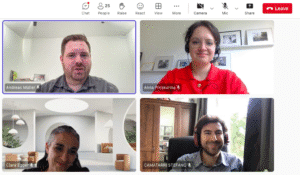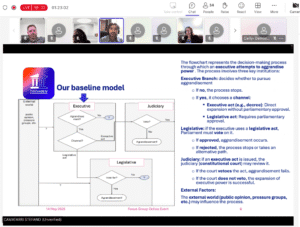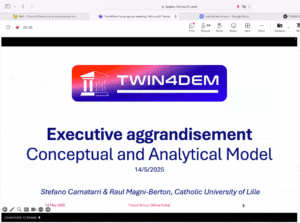Date of event: 14 May 2024, 16:00 CEST
On May 14, the TWIN4DEM project held its first transnational focus group titled “Democracy in the Digital Age: Introducing the TWIN4DEM Approach.” The session brought together 18 participants from all four partner countries. The group included a strong presence from civil society actors, reflecting the project’s commitment to grassroots and civic engagement. Engaging policy makers and journalists remained a challenge, highlighting the very democratic gaps the project aims to address.
Structured Dialogue, Rich Reflections
Participants engaged in a mix of plenary and breakout sessions, with around 40 minutes allocated to small-group discussions. These breakouts proved especially fruitful, with participants expressing a desire for even more time to delve into the complex issues at hand. Core themes included executive aggrandisement, democratic accountability, and the shifting balance of power in EU member states.

Breakout Room Highlights
The Netherlands
Discussions revealed that signs of executive aggrandisement are subtle but present, especially in the form of fragmented coalitions and public discourse manipulation. Participants noted a shift from political to societal democracy, with grassroots movements around healthcare, housing, and food gaining momentum. Concerns were also raised about right-wing populism, limits on protest rights, and media framing, with historical references to figures like Pim Fortuyn and current debates on asylum policies.
Hungary
Participants discussed a landscape marked by low accountability and civic disengagement, with a clear distinction made between civil organisations and an active civil society. Post-COVID and geopolitical shifts have reshaped democratic norms. The lack of tools for citizen resistance, limited political education, and minimal trust in participatory structures were highlighted as serious barriers to democratic resilience.
France
While the legal framework remains intact, participants noted a perceived rise in executive dominance, especially under President Macron. Some viewed this as a reaction to a fragmented parliament, currently split between four major groups. The concentration of power was seen not as autocratic, but as a legal shift within the system’s boundaries. Concerns were raised about framing, public opinion influence, and the role of the media and judiciary. Participants found the TWIN4DEM model intellectually rich and were curious about how it would adapt to the French context.
Key reflections included:
- “What happens is legal, but may feel autocratic.”
- “The exercise of executive power depends on political leadership and context.”
- “We must not confuse legality with legitimacy when it comes to power concentration.”
Czechia
Participants drew contrasts with Hungary, noting that in the Czech context, institutional processes remain stronger, though concerns exist around civil society suppression through financial control. The executive uses councils to influence civil society’s participation, and though checks and balances exist, their effectiveness is debated. While constitutional hijacking is not occurring in the same way as in Hungary, the balance of power and institutional independence remain hot topics.

Participant Reflections: In their own words
Participants were invited to reflect in the chat on two open questions at the beginning and end of the session:
- What people remembered or learned:
- Citizens are central to democracy, not just government.
- “Aggrandisement” is a key concept for understanding power shifts.
- Democracy is a living system that requires active care and participation.
- When asked “What’s the first thing that comes to mind when you hear ‘government’?”
Responses included:
- “Parliament,” “Big Brother,” “responsibility,” “bureaucracy,” “coalition,” “service delivery,” and “administration of the people.”
- What should be the role of government?
Participants envisioned government as:
- A provider of public goods, guardian of justice and equality.
- A listener and enabler of society.
- A responsible leader that protects the vulnerable and represents all citizens.


